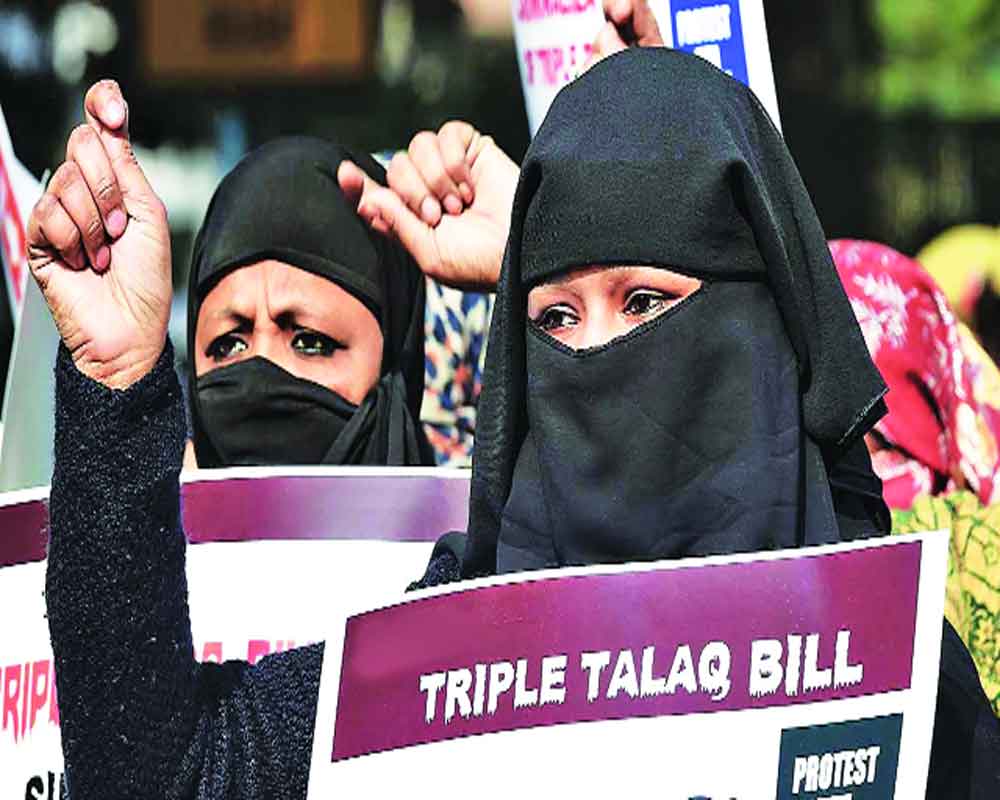Defending its 2019 Triple Talaq Law in the Supreme Court, the Modi Government has argued that the legislation was crucial for protecting the rights of Muslim women and promoting gender justice.
In an affidavit filed in response to petitions challenging the law, the Government said despite the Supreme Court’s 2017 ruling setting aside the practice, it has “not served as a sufficient deterrent reducing the number of divorces through this practice” within the community.
The Government argued that the practice legitimised and institutionalised the abandonment of wives by their husbands and was “neither Islamic nor legal.”
“Taking note of all these factors, we are of the considered view that the ordinance in question has been brought into force in accordance with the requirements of law only to make more effective implementation of the law laid down by the Supreme Court in the case of Shayara Bano vs Union of India (supra) in the form of an ordinance and we see no reason to make an indulgence into the matter,” the Centre said in its 433-page counter affidavit reminding the court of its own Constitution Bench judgment of 2017 in the Shayara Bano case, which had held triple or instant talaq (talaq-e-biddat) manifestly arbitrary.
This comes in response to a plea by the Samastha Kerala Jamiathul Ulema, which sought a declaration that the Muslim Women (Protection of Rights on Marriage) Act, 2019, is unconstitutional and violative of Articles 14, 15, 21, and 123 of the Constitution. Triple talaq is a form of divorce that was practiced in Islam, in which a Muslim man could legally divorce his wife by pronouncing “talaq” three times.
The Supreme Court had declared instant triple talaq -- where a Muslim man utters talaq (divorce) three times to his wife, without her consent, and vice versa -- as “void, illegal and unconstitutional”. The Centre then implemented a law in 2019 criminalising the instant divorce practice with a maximum of three years of imprisonment and a fine.
According to petitioners, the Act violates fundamental rights, including those that guarantee Indian citizens equality before law and prohibits discrimination on grounds of religion. Explaining the context in which the law came to be enacted, the government said “essentially” the “practice” of talaq-e-biddat or instantaneous triple talaq “legitimised and institutionalised abandonment of wives by their husbands” and “did not simply result in a private injury but in a public wrong as it militated against the rights of women and the social institution of marriage itself”.
The government further said that the practice of Tala- e-biddat was held unconstitutional and a need was felt to have a standalone legislation to address the same. Therefore, the contentions of the petitioners that the present case ought to be equated with other forms of non-compliance and statutory violations in the process of divorce must be set aside at the outset, as this seeks the perpetuation of illegality which is not covered under Article 14.
Citing reports of triple talaq from different parts of the country despite the Supreme Court order, the government said the victims had no option but to approach the police for redressal of their grievances. It added that the police were helpless as no action could be taken against their husbands in the absence of punitive provisions in the law.
The law was brought in to protect the rights of married Muslim women who are being divorced by way of triple talaq, the government argued. The Centre stressed an urgent need for stringent provisions in the law, which act as a deterrent to Muslim husbands divorcing their wives by adopting instantaneous and irrevocable talaq.
“Since, the Supreme Court declared that divorce through triple talaq is unconstitutional, Parliament, in its wisdom, is empowered to make it an offence and hence no unconstitutionality is involved in the matter,” the affidavit said.
“It is submitted that Parliament in its wisdom has enacted the impugned Act to protect the rights of married Muslim women who are being divorced by triple talaq. The impugned Act helps in ensuring the larger constitutional goals of gender justice and gender equality of married Muslim women and helps subserve their fundamental rights of non-discrimination and empowerment,” it added.
The Centre also said there is “no basis to the claim that marriages being under personal law, they are exempt from the application of the general criminal law”. It said, “Marriages are a social institution which the State has a special interest in protecting. It is beyond doubt that the state can protect the stability of marriages by resorting to the device of criminal law. Enactments such as the Domestic Violence Act, 2005, the Dowry Prohibition Act, 1961, etc are all enacted under the same general principle as the present law i.e. preserving the sanctity of the institution of marriage”.
Jamiat claimed in its petition that “criminalising a mode of divorce in one particular religion while keeping the subject of marriage and divorce in other religions only within the purview of civil law, leads to discrimination, which is not in conformity with the mandate of Article 15”.
























